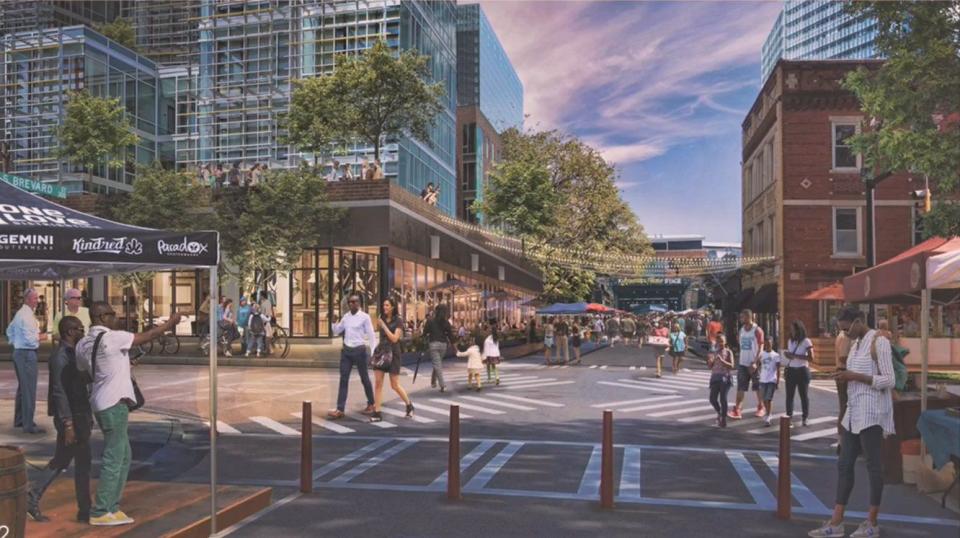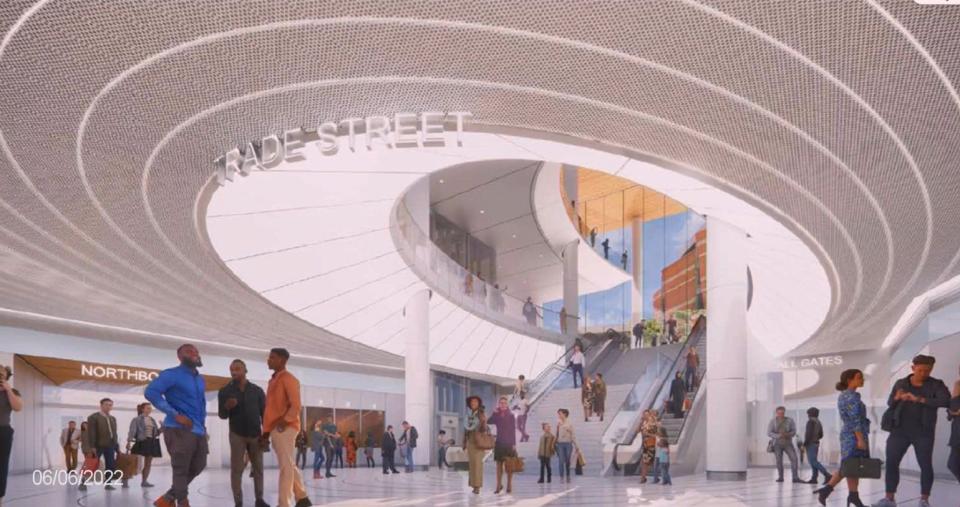Charlotte City Council approves $275 million for Spectrum Center upgrades, practice facility
Charlotte City Council voted, 10-1, Monday to approve $275 million worth of improvements for the Spectrum Center and a new state-of-the-art practice facility in a redeveloped transit center across the street.
Charlotte City Council has approved the $275 million for the Spectrum Center upgrades and practice facility. It was a 10-1 vote. @BraxtonWinston voted no https://t.co/JRwec46O0o
— Joe Bruno (@JoeBrunoWSOC9) June 14, 2022
As the owner of the arena, the city is obligated to keep the 17-year-old Spectrum Center up to date. For three years, the city and Hornets have been working with consultants to come up with a plan for the building.
Nearby business owners told City Council a vibrant Spectrum Center keeps them going.
“I think it is money well spent,” Aria owner Pierre Bader said. “I am a little selfish being here because every time there is a concert or basketball game. Our restaurant is packed.”
There will be a new state-of-the-art Performance Enhancement Center for the team. The $60 million project will be funded by new revenues and naming rights. It will be located across the street from the Spectrum Center in a redeveloped transit center. Plans call for the buses to move underground with retail, the practice facility and towers above. The developers are Dart Investments and White Point Partners.
In conversations between the city, Hornets and consultants, the city and Hornets agreed on $173 million worth of improvements that are “contractually obligated.” The city will also kick in a $42 million upgrade for a total of $215 million. The project will use the tourism fund, which is derived from rental car and hotel taxes.

UNC Charlotte alumna Grace Fendrick has researched stadium subsidies and told the city council to not get their hopes up for a big economic boom from the development.
“The idea that a practice facility will bring in any statistically economic impact to this city is laughable,” Fendrick said.
“It has been phenomenal partnership,” Hornets President Fred Whitfield said in an interview with Channel 9′s Joe Bruno. “We take very seriously our duty and obligation to be great stewards of this building that the city owns.
“It does not get paid out of the general fund,” Assistant City Manager Tracy Dodson said. “This does not take away from so many things that we put funding towards like police, fire and the corridors of opportunity.”
A new rendering of the proposed transit center redevelopment that will include a new practice facility for the Hornets @wsoctv pic.twitter.com/o8sV1OLJZ0
— Joe Bruno (@JoeBrunoWSOC9) June 6, 2022
“It will be one of the best, we’re going to do everything we can to future proof,” Whitfield said. “It will be a fluid process and it’ll be a partnership.”

“It’s going to be a great facility that not only keeps us competitive, but also is a great recruiting tool for bringing in free agents as our young team continues to get better,” Whitfield said. “It’s a necessity now in NBA if you want to compete.”

As part of the deal, the Hornets lease will be extended to 2045. It’s currently set to expire in 2030. A master plan will ultimately lay out the building’s future. The hope is to start some construction work this summer and will spread over four years. The practice facility is expected to open in the 2027 fiscal year. Construction is not expected to disrupt the Hornets season or the ability to host major events.
Hornets statement: “Hornets Sports & Entertainment truly values the public-private partnership that we share with the City of Charlotte, including our agreement to manage Spectrum Center, which is a city-owned building. We want to thank our mayor, the City Manager and his office, and the entire Charlotte City Council for recognizing the economic and community impact that Spectrum Center has within our region. We look forward to continuing to serve as stewards of Spectrum Center to make it the premier destination for sports and entertainment in the Carolinas. We are thrilled to have extended our lease agreement and ensure that Spectrum Center and Uptown Charlotte will remain the home of the Charlotte Hornets for an additional 15 years through 2045.”
------
“Being able to have a state-of-the-art building right in Uptown Charlotte with the entertainment district that will be lively and vibrant is something that we think will be very attractive,” Whitfield said in May.
ALSO READ: Charlotte FC fires Head Coach Miguel Ángel Ramírez
The city wants to move quickly. Charlotte City Council was briefed on the project May 30. There was another discussion the following week for more questions.

The city said the project will not prevent other tourism fund projects from happening. The city also said it will not impact a potential deal for renovations at Bank of America Stadium, which uses the Convention Center Fund.
Under the deal, the Hornets will pay increased rent at the Spectrum Center. Hornets Sports and Entertainment, HSE, would pay $32 million in rent through 2045. HSE would also contribute additional funds to the Capital Fund Account, $1.1 million a year through 2045. The deal has HSE paying all operating expenses at the Spectrum Center and on the hook for any cost overruns for the arena upgrades and performance enhancement center construction.
ALSO READ: Hornets announce firing of head coach James Borrego
Charlotte City Council discusses the proposal
Charlotte City Council members appear largely on board with this requested funding and this major project, but some are a little frustrated at how the city got to this point.
Councilman Malcolm Graham touted the benefits of having a well-equipped uptown arena.
“Spectrum Arena is basically our living room,” said Graham. “It’s more than just basketball, it’s concerts, it’s political conventions and other things that bring economic value to our community and city.”
Mayor Vi Lyles says the city crafted a good deal with the Hornets.
“We are a sports town,” Lyles said. “We have sports in our DNA, and we are going to continue to support our institutions, every one of them, because they add to the vibrancy and quality of life in this community.”
Some councilmembers are frustrated at how the original agreement with the Spectrum Center was negotiated leaving them on the hook for a minimum of $173 million in upgrades without a guaranteed tether.
“Because of councils, staff and leadership 10 plus years ago, we’ve been handed a huge bag of excrement right now that we have to work our way through,” Councilman Tariq Bokhari said.
“When I was a kid, I loved Captain Crunch but you couldn’t eat it without milk because you couldn’t swallow it,” Mayor Pro Tem Julie Eiselt said. “And that first part, the $173 million, is a little bit like eating Captain Crunch without milk but it is what it is. We have to do it.”
The frustrations appear unlikely to change the scope of the project, which leaders want passed in two weeks. Some councilmembers are already hoping the upgrades will bring the return of major events.
“Hopefully with this we will bring CIAA back,” Councilmember Dimple Ajmera said.
History of the Spectrum Center
To become what it is today, the Spectrum Center had to go through some hurdles and scrutiny.
When the city first started talking about the arena, it was at the top of a priority list aimed at bringing more tourists to Charlotte.
Then, in a referendum vote held back in 2001, 57% of voters decided against spending public money to build it. But despite the public’s opinion, Charlotte City Council decided to build the arena anyway.
In October 2005, the building -- which cost $265 million to build -- opened as the Charlotte Bobcats Arena.
Critics of the new arena thought the old Charlotte Coliseum on Tyvola Road was just fine and didn’t want it replaced. For nearly 20 years, the Charlotte Coliseum had hosted NBA games for the Hornets and then the Bobcats.

It even became a place of refuge for Hurricane Katrina survivors in 2005.
After the city sold the property, the Charlotte Coliseum was reduced to rubble.
In July 2012, crews began renovating suites for media and other guests, as well as transforming the arena’s gift shops into work spaces for Democratic National Convention staff. The Bobcats training basketball court was also turned into a media filing center.
(WATCH BELOW: Mecklenburg County budget only provides half of requested extra CMS funding)

